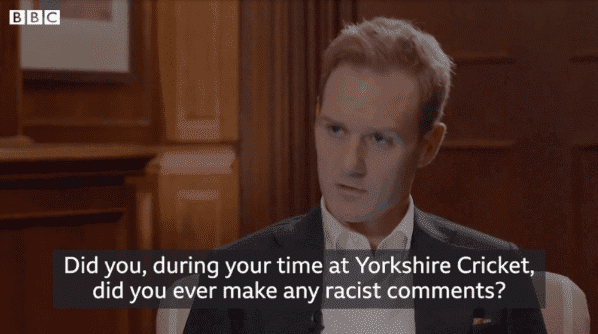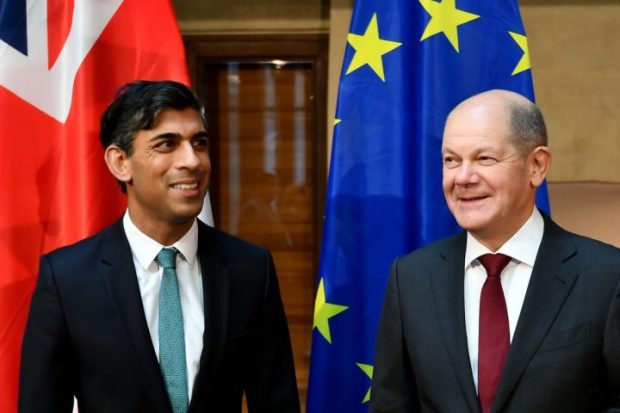After dropping Michael Vaughan in punishment for what he said (or might not have said) many years ago, the BBC has now given him the chance to explain himself. It took the form of Dan Walker, a BBC1 Breakfast host, confronting the accused with examples of his wrongthink and hearing his defence. That defence is pretty academic now, given that Vaughan has already been dropped from covering the Ashes this winter and may now disappear from the screens entirely. But it has given us an example of what may now lie ahead in the cancel culture we are adopting. Ten years after the Tweets comes the outrage. Then the cancellation. Then, last of all, the show trial.
It was unpleasant seeing Vaughan, a former England cricket captain, squirming on the hook as Walker went through the charge sheet. The moralising was worse. Walker read out a series of old tweets that Michael Vaughan had posted years before: ‘The old tweets of yours that have been doing the rounds for the last few weeks from 2010…you said, ‘not many English people live in London; I need to learn a new language’, and you also said why, when you ring 118, are all the people foreign; can’t make head or tail of what they’re saying’. Poor Walker, he was plainly pained even to read this stuff.
As to the substance of those first two observations: in the first place, they were made some time ago. Azeem Rafiq, who made the allegations of racism against Vaughan was let off lightly when some off-colour remarks of his own some years ago on social media about Jews were released – every commentator hastened to observe that these were ‘historic’ and therefore excusable. Certainly; but in that case, why – as Piers Morgan pointed out – the double standards on Vaughan? (Who, for the record, did not mention Rafiq’s own misdeeds.)
The interview left us wondering: what did Vaughan say that was wrong? That bit about London not having many English people – it is in some ways a statement of the obvious and the last person I heard saying it was my Albanian mother in law from Kosovo. London is diverse, which is the positive way of looking at it, or full of foreigners, which is the other take; either way, it happens to be true.
As for the claim that directory enquiry phone service is often staffed by people whose first language isn’t English and whose grasp of the language is far from perfect? That too is a statement of the obvious. At one stage, BT was putting 118 directory enquiries through to a call centre in New Delhi, raising issues of geographic familiarity as well as language. Not many people use 118 nowadays, but I recall lots of the operators not being familiar with the places I was asking about nor with the names, and struggling a bit with the language. And yes, that was a pain. They were polite though.
But the killer Twitter quote was Vaughan agreeing in May 2017 after the Manchester Arena bombings that it might be appropriate that Moeen Ali, a fellow player, ‘should be asking Muslims he doesn’t know if they are terrorists’. He first agreed to the suggestion on Twitter; then, asked by a writer, Adil Ray, to confirm it, said, ‘Adil, If it’s going to help our kids’ future and environment become a safer place, then YES.’
That was unfortunate, but I think what he was driving at was that Muslim cricketeers should use their influence with other Muslims who might be susceptible to Islamism to steer them away from bad influences. It was probably a silly idea, but the notion of prominent Muslims using their punch against extremism is not in itself malign; quite how you’d open such a conversation is another matter. Silly Vaughan, for rising to the bait.
Walker had another accusation, that Yorkshire players, including Vaughan, weren’t able to pronounce an Asian player’s name, instead calling him ‘Steve’. I think that’s what activists call micro-aggression. ‘Is that acceptable now?’, asked Walker. Well, there was only one possible response to that, and he got it. Vaughan squirmed, apologised, said he wouldn’t do it now and, my, how times have changed.
The interview was, in a way, like a very bad version of a Catholic confession: you acknowledge your sins, you express repentance and a firm desire of amendment. Then you get absolution and your penance. Except most priests don’t judge you before you even open your mouth. And they actually forgive sins. What we got in this interview was the grilling, the accusations of thought crimes, the confession, the repentance, but no absolution because, no one is in a position to convey it. And in this case, the interviewer does not simply ask questions; he sits in judgment.
And this is part of the contemporary pattern with the BBC. It long ago gave up impartiality in the sense that its people seek dispassionately to report or elicit information, leaving it to commentators to draw morals and to viewers to draw their own conclusions; now the line between reporting, interviewing, condemnation and value judgments is routinely erased, on the assumption that the audience will share the world view of the interrogator. Indeed, most BBC people don’t even get their heads round the idea that there may be an alternative view. It’s not just racism; any news report on ‘a woman’s right to choose to have an abortion’ will make perfectly clear that there is only one take on this matter. As David Blunkett observed in a newspaper article today, BBC news values have deteriorated.
He advised the Corporation that it is ‘playing into the hands of its critics by becoming almost the caricature its opponents think it is’. Well, quite so.
Michael Vaughan is now fighting for his career as a cricket commentator. For what? As one of the Asian players whom he captained observed, he’s being condemned without evidence. This is a man’s career and livelihood and good name that is being destroyed. The one moral of this very disturbing episode is that if you are a sportsman or even remotely in the public eye, you should never, ever take to social media about anything or, if you must, make it something utterly anodyne; happy face if your team wins, sad face if it loses, shame about the weather. The other is that you should be careful what you say, and to whom.
Don’t put anything in writing, especially online, that anyone, anywhere, might be offended by. Look over your shoulder before you make any observation that you don’t want to be confronted with by the likes of Dan Walker in a few years’ time. Whatever you say, say nothing. That old Irish republican adage, subsequently adopted by Seamus Heaney, is the only safe way to go.
Got something to add? Join the discussion and comment below.
Get 10 issues for just $10
Subscribe to The Spectator Australia today for the next 10 magazine issues, plus full online access, for just $10.




















Comments
Don't miss out
Join the conversation with other Spectator Australia readers. Subscribe to leave a comment.
SUBSCRIBEAlready a subscriber? Log in